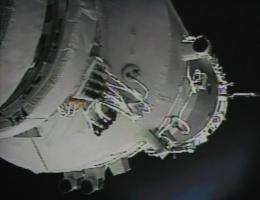A photo of the giant screen at the Jiuquan space center shows the Shenzhou-9 spacecraft undergoing the automatic docking with Tiangong-1 module on June 18. China, which sent three astronauts into orbit a week ago, said they would conduct the nation's first manual space docking on Sunday -- a key step to building a space station.
China, which sent three astronauts into orbit a week ago, said they would conduct the nation's first manual space docking on Sunday -- a key step to building a space station.
In a brief dispatch, the official Xinhua news agency Saturday quoted an unnamed spokesman for China's manned space programme as saying that the highly complex manoeuvre would take place at noon (0400GMT) the following day.
The technique is hard to master as it involves two vessels -- placed in the same orbit and revolving around Earth at thousands of kilometres per hour -- coming together very gently without destroying each other.
China's current space mission kicked off last Saturday when the Shenzhou-9 spacecraft took off carrying China's first female astronaut. Two days later, it came together with the Tiangong-1 module already in orbit around Earth.
China has carried out automatic dockings three times already, but the main goal of the current manned mission -- China's fourth -- is to complete the first manual 'kiss in space', which requires great accuracy from astronauts.
China aims to complete construction of a space station by 2020, a goal that requires it to perfect docking technology -- a delicate manoeuvre that the Russians and Americans successfully completed in the 1960s.
The ability to dock manually is necessary in case of any problems with the automatic procedure, such as the control centre being unable to carry it out remotely from Earth.
The team -- headed by Jing Haipeng, a veteran astronaut on his third space mission -- have rehearsed the procedure more than 1,500 times in simulations.
Liu Wang, who has been in the space programme for 14 years, will be in charge of manual docking manoeuvres, while Liu Yang, China's first woman to travel to space, will conduct aerospace experiments during the mission.
China sees its space programme as a symbol of its global stature, growing technical expertise, and the Communist Party's success in turning around the fortunes of the once poverty-stricken nation.
(c) 2012 AFP
























